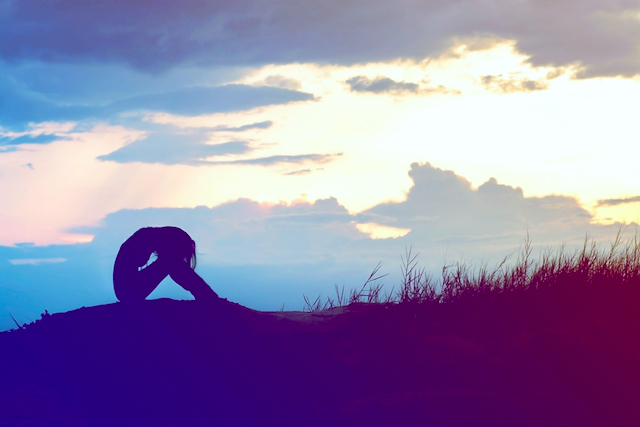
“The primary cause of unhappiness is never the situation but thought about it. Be aware of the thoughts you are thinking.” ~Eckhart Tolle
Just about everyone experiences sorrow at times. I know I do.
The other morning, in fact, I was caught off guard by a very particular sorrow. Nothing happened, per se; but from the moment I awoke, I felt an aching sense of sadness and loss at the fact that my career path has taken me away from the field of mental health counseling.
As I became aware of my sorrow, it filled my heart and mind like a cup, and eventually spilled over into a rather woeful consideration of the many changes my life has undergone over the past several years.
It was uncomfortable while it lasted, but it was also quite fascinating, once I became aware of what was happening. As such, I emerged intact and, ultimately, quite proud of myself for waiting out and weathering such an unexpected emotional storm.
I haven’t always dealt with my emotions this way—sorrow, fear, uncertainty, inadequacy, and guilt in particular. Indeed, I still slip into old habits at times.
My life has proven an excellent instructor, however, and I am pleased to note the above-described scenario is becoming more commonplace.
Vocation has been extremely important to me. In fact, I clearly recall a moment in my childhood when I declared to myself (in so many words), “I want my work to be meaningful and enjoyable.” That notion has informed my life ever since.
When it came time for me to declare a major in college, I mulled my options and settled on theatre. I knew it wasn’t practical, per se, but it was meaningful to me and I enjoyed it. Besides, I trusted that the act of honoring my passion would lead me down the road I needed to travel. I think I was correct.
A year or so following graduation, I took the next step and moved to New York City to pursue my career in acting. It was an exciting time at first. After several years, however, I was exhausted, disillusioned, and burned out.
The things I needed to do to pursue my career as an actor—“pound the pavement,” rehearse nights and weekends, and work day jobs to support myself—had become nothing short of onerous.
My originally hoped-for payoff (earning a living as an actor) was no longer worth the commitments and sacrifices necessary to taking an honest shot at it.
Once I accepted that truth, the decision to stop was a relatively easy one to make. Waiting for me on the other side of that decision, however, was the ominous question “Now what?”
I had the luxury of avoiding the question at first, because I was attending to other aspects of my life, which, in many regards, was on auto-pilot: I got married, my now-ex-wife and I moved, she entered law school, and I started working full time to help support us.
Life settled into a routine, and, to my dismay, the urgency of the still-unanswered question “Now what?” intensified. I approached it with a sense of helpless, dire urgency; as such, I soon descended into a full-blown existential crisis.
Whereas my path forward had once seemed so clear and exciting and full of promise, it was now almost entirely hidden from my view. I was tormented by the uncertainty. Full of fear and bereft of experience and perspective, I did the only thing I knew how to do: avoid change.
I helped maintain my status quo by, alternately, complaining; losing my temper—usually with my ex-wife—over trivial frustrations; pretending to most of my family and friends that everything in my life was going well; and performing what I call “mental gymnastics”—attempting to trick myself in so many ways that I did not, in fact, hate most things about my life, including myself.
The fact that I had no compassion for myself in view of my vocational confusion, and that I could not accept my own discontent and act accordingly, ensured a certain spiritual toxicity.
The result, of course, is that I viewed the world through a lens of sadness and anger and darkness.
Finally, I had the good sense to say, “Enough.”
With some assistance, I slowly reconnected with myself.
I rediscovered my talents and positive attributes, which, along with the consideration of several of my interests, led me to pursue graduate studies in social work.
I felt it was finally time to enjoy my life, fulfill my destiny, and settle into a contented peace. In reality, everything was about to change.
Yes, grad school was transformative and exhilarating, but it was also the backdrop for what was, perhaps, an even greater learning opportunity: my divorce.
In the immediate aftermath of my separation, I stuck with my old habit of experiential avoidance. Cracks in the armor quickly appeared, however; and besides, my work as a practitioner-in-training ensured I couldn’t realistically hide for long (thankfully).
I had the good sense to seek counseling.
Over the next few months, I learned that I have the tendency, as do many of us, to “jump” out of experiences I deem to be “bad” and into other “good” experiences I would prefer.
In my case, I was experiencing feelings of deep guilt and sadness in the wake of my divorce, but instead of acknowledging my guilt and sadness, I jumped headlong into self-hatred and shame.
That might seem counterintuitive at first glance; after all, how could I, or anyone, ever prefer or deem good the acts of self-shaming and hatred?
What I’ve come to discover, sadly, is that many of us, consciously or not, do just that. We find it safer to attack ourselves than it is to abide certain experiences—such as vulnerability, guilt, fear, and sadness—that we believe may hurt us even more.
Each of us, I would argue, has these types of emotional sore spots that, when triggered, send us into a basic sort of survival mode.
While that looks different for each person, one factor remains constant: something about that “emotional sore spot” experience seems fundamentally unacceptable; and, after all, what does one do with something fundamentally unacceptable but reject it somehow?
For my part, I discovered my “jumping” into self-hatred and shame is a learned behavior.
It is a well-intentioned one, perhaps, in that it is designed to guard me from what I perceive to be the dangerous experience of acknowledging my (real and imagined) limitations and imperfections; but it is one that ultimately prevents me from fully dealing with, and taking ownership of, the myriad truths of my life.
I learned to appreciate the validity of the statement “what you resist, persists.” I saw how that which remains unacknowledged and unprocessed can grow toxic, thereby greatly exacerbating the original problem and greatly amplifying suffering.
I recognized deeply held irrational beliefs about myself, namely, that if I don’t always get everything right, I’m a total screw-up who is unworthy of any positive regard, let alone love, and a propensity for labeling (i.e., “good” and “bad”). These had been the real cause of my extreme suffering, because they incited reinforcing, harmful behaviors.
I realize now the experiences of sadness and pain itself are just that: experiences of sadness and pain. They are not some fundamental threat to my well-being or a rubber-stamped comment on the quality of my personhood.
If I acknowledge these experiences, sit with them, explore and express them, I can choose my actions accordingly without jumping into shame, self-hatred, or other unhelpful behaviors.
So when I woke up the other morning and felt sadness wash over me, I was able to welcome it. I was able to give myself compassion by telling myself, “You’ve been through a lot, buddy, and it’s okay to feel that.”
And that’s just it, you know? That’s the antidote: compassion.
I’ve found that by giving myself compassion—the literal and metaphysical space to abide the emotional experiences I generally deem “threatening”—I am able to discover catharsis, forgiveness, peace, acceptance.
In sitting with our feelings in this way, we are able to live, truly—to be open to the experiences of our lives.
Photo by Almonroth
About Nathan Gismot
Nathan Gismot lives in Colorado with his loving partner, Kristy, and an awesome little corgi named Willow. Nathan has myriad interests and enjoys writing about nearly all of them. You can find some of his work on his blogs: mentalhealthforhumans.blogspot.com and positivelynathan.tumblr.com. You can also follow him on Twitter @nategismot.













 Though I run this site, it is not mine. It's ours. It's not about me. It's about us. Your stories and your wisdom are just as meaningful as mine.
Though I run this site, it is not mine. It's ours. It's not about me. It's about us. Your stories and your wisdom are just as meaningful as mine.
Thank you for this wonderful article. I think I may be resorting to self-hatred to block other uncomfortable feelings. I am unsure how one is supposed to acknowledge feelings and move forward from them – I know they are there, I feel them every day, what does it take to actually acknowledge and move forward?
Hi Erin I hope you don’t mind me replying to your question. I would suggest finding a time when you will not be distracted, find a quiet space and focus on your breathing for a while until you begin to relax. tell yourself this is a safe place and you are ok. Then allow yourself to notice what is going on. Where is the discomfort? Is it in your body ( a knot in your stomach or a heaviness in your chest for example) if so welcome it. Feel it. Sit with it. Ask it what it is trying to tell you. But all the time allowing, not judging or criticising, just simply noticing. I usually try not to look for resolutions or answers at this time. Imagine it like youre sitting on a beach and just be there allowing the huge tidal wave to come. You immerse yourself in it and just allow it to wash over you. Thats just a suggestion as it is what I find helpful. But you may find your own way. Love and peace to you on your journey x x
I think this is an excellent suggestion, Helen, and I really like how you articulated the process of “not judging or criticising, just simply noticing.” I also appreciate your suggestion of exploring the association of the discomfort with physical sensations.
Helen’s suggestion is fantastic. I just wanted to add that something else that helped me was journaling about my emotions/thoughts for a little while. Seeing them written out in front of you puts a little distance between you and them, really allows you to identify it and allow it to be there. You don’t have to write for too long; but in the beginning be patient and compassionate with yourself, it may take some time to emerge and that’s okay.
I think this is another excellent suggestion. I’ve personally found journaling to be extremely helpful.
I think part of it is to cultivate patience with yourself, and with the process. I’ve found (with myself and with others) that the process of acknowledging, accepting, and moving on can be anything but linear. It can be gradual, incremental, and can feel like it’s “two steps forward, two steps back” at times, which can feel frustrating. So there’s that element of reminding yourself that it can take time — and that it’s a different process for everybody. But I think that your “how” question is also addressed by the process itself; that is, the more you make a practice of acknowledging and accepting your feelings, the less “grip” they will have on you. All the best to you.
Wow only last night I tried to sit with a heaviness in my heart space that I have been ignoring and avoiding for the last couple of months. Its so easy to avoid the discomfort and distract and numb ourselves from painful feelings. I think the fact that this article has arrived today means the universe is trying to tell me to be with the discomfort and allow it to process. Thank you I enjoyed reading this and thank you for sharing your experiences x
I’m so glad you enjoyed reading the article, and you’re very welcome — it was a pleasure to share. I applaud you for sitting with the heaviness in your heart. It isn’t easy, is it? All the best to you.
Thank you so much for this, I needed this today. I’m in the process of leaving a job that I love dearly & pursuing my career as a CBT therapist, no matter how I push my feelings down they keep spilling back out. Compassion takes practice & leaving the ‘shoulds’ behind & we all get our old comforters out in times of stress. Thanks for sharing your story, it helped me feel.
You’re very welcome — I’m glad the timing of the article was fortuitous for you. I agree that compassion (and leaving behind those pesky ‘shoulds’) takes practice. I think it’s an ongoing process.
I really liked how you isolated some responsibility with shame.
“I discovered my “jumping” into self-hatred and shame is a learned behavior.”
I think some most people think it is a trap that is impossible to elevate from, but they are wrong!
Thank you for that gentle reminder Nathan
You’re welcome! Thank you for your feedback. I’m glad you liked it.
Yes. Thank you for this. It is what I try to convey to my clients, and what I try to remember for myself as well.
You’re welcome! And thank you for your comments. 🙂
Wonderful article.
One thing I’ve found that helps me be open to feeling painful emotions is the idea that as humans, we’re meant to experience a rainbow of emotions in life. If we don’t experience loss, how do we truly treasure all that we have? If we don’t allow ourselves to feel sad, how can we truly experience joy? If we don’t experience hurt, how do we learn to draw healthy boundaries (without ourselves or others). [Note: I believe the credit for this example goes to Pema Chodron]
I grew up believing that one should always be happy (a lesson well-intentionally taught by my father)–which meant I didn’t “allow” myself to feel jealous, frustrated, or unhappy. As you can imagine, trying to attain this led to a lot of painful self-hatred, shame, and frustration, but thanks to a therapist and some self-exploration, I understood that I was expecting unrealistic perfection out of myself. Later, I grasped just how unhealthy this was to my overall well-being. Having housed such unhealthy expectations led to my stuffing down all my negative feelings since I was a child, leaving in its wake a green cloud of mutating, pressured emotions just under the surface that over time, morphed into complicated amalgams of proto-emotions. Every now and then, part of those corked emotions would slip out in response to a trigger (usually as anger, panic attacks), and it felt so nonsensical that I worried I was crazy.
Crazy, I was not, just taught to handle painful emotions incorrectly. To be compassionate to myself, I grew up under stressful circumstances, so covering up was the best thing I knew to do as a child (and my father knew no different, so his teachings to always be happy reinforced it).
Thankfully as an adult, I discovered how to slowly open myself up to those old painful memories and emotions I’d kept locked away, and exploring them was the hardest thing I’ve ever done in my life. The process was terrifying, awful, and exhausting; that green cloud had been corked up for so long, once it vented it came out stinky, old, and really loud.
Once the process ended however (and it DID end), it was glorious. I felt like a new person.
I still had (and have) more to learn– old patterns of reacting to stressors has reinforced my panicked response, but I’m seeing an unbelievable therapist who is leading me in the right direction.
Thank you for sharing your story! I’m glad for you that you have come out on the other side of your process of opening yourself up to your “old painful memories and emotions.” I’m sure others will find solace in your experience.
Can you share your therpist’s name. Would love to work with someone who can really help me.
Absolutely Cindy, but one question– I live in Washington, DC where he practices, is this anywhere near you?
Savannah: Any chance you see Marsha Lucas? I used to see her when I lived in DC and a lot of what you said resonates with me and the work we did together.
And thank you, Nick, for this beautiful article!
Hi Gabie, no, that is not the name of my psychologist but I’m glad you found someone great who worked for you!
Thank you for this. I am in so much pain currently and hate myself for it.
GREAT post!!! Thank you for sharing your journey, and wonderful insight into a good description of human behavior! The antidote is compassion, love that!!!!!! Thank you!! 🙂
Thank you so much for your compliments! It was a pleasure to share. 🙂
YES! This experience is a carbon copy of my own. Feelings are just that…feelings. I have to allow myself to just watch and observe the feelings and not get caught up, acting them out…drug-free. And you also shared that you found GOOD in the midst of the feelings. May 12, 2013, I got “hit” with great feelings of darkness and depression about 11:30pm and I was SURE it was because of something someone said to me. I just got still and found myself digging in the flower beds planting perennial flowers. I couldn’t go into town without stopping by a nursery and coming home with a truck load of flowers. At the end of the 3-week depression, I found myself at Village Green with another armload of flowers and I asked internally, “What’s the deal with all these flowers?” The answer came back to me, “Be Still. It’s cheaper than a therapist!” During the summer, when Danny and I would have our morning coffee out on the patio, we really enjoyed the beauty of those flowers gracing our back yard. We would not been able to enjoy all that beauty had it not been for those 3 weeks of darkness. Keep looking for the gift! I also discovered that earth had a huge hit from solar flares on May 13th and my body seems to be very sensitive to earth changes such as tsunamis, hurricane katrinas, and the like…best for me to be still and ride out the emotions. And yes, journaling and writing or typing it out does help me.
Well said. I have worked through a similar experience since my 2012 separation and divorce. It has been difficult but ultimately cathartic to accept my emotions non-judgmentally and develop compassion for myself. I have found the book ‘Emotional Intimacy’ profoundly helpful in this endeavor. Thank you for articulating this so well and for your well developed and appreciated (by me anyhow) grammar correctness. Your prose is captivating.
Thank you very much for your comments and compliments. I’m glad that you reached catharsis, and developed a non-judgmental and compassionate approach to your emotions. Thanks, too, for the book recommendation! All the best to you.
This is brilliant. I love how you are so open and real about your experience. I see myself in so much of it. Also, totally agree, the only way out is through. And self-acceptance and compassion are essential! Do you have a personal blog? Jo
Thanks very much for your comments and affirmations, Jo! I do have a few blogs — the addresses are in my bio above. Thanks again.
I absolutely love this article. Thank you for sharing!
I’m so glad you feel that way. You’re welcome! Thanks for your comments.
Thanks Nathan
You’re welcome!
This is a lovely post, Nathan. Thank you.
I can relate to the actor who then drifts. I’ve done that and eventually gave it up too. I like the clarity of your description “as no longer worth the commitments and sacrifices necessary to taking an honest shot at it”.
I think acting can be a slightly unhealthy experience and social work may well “undo” some habits. As an actor, you go looking for trouble – that’s what makes a scene interesting. It’s not a great way to live your life though.
The comments about “urgency” are really strong. It’s often the sense of urgency that makes a drama rather than something to simply work through.Hurt just wants to be heard, solutions can come later. I will remind myself that it’s not urgent.
Thanks again 🙂
Thanks very much for your comments, Tania. 🙂